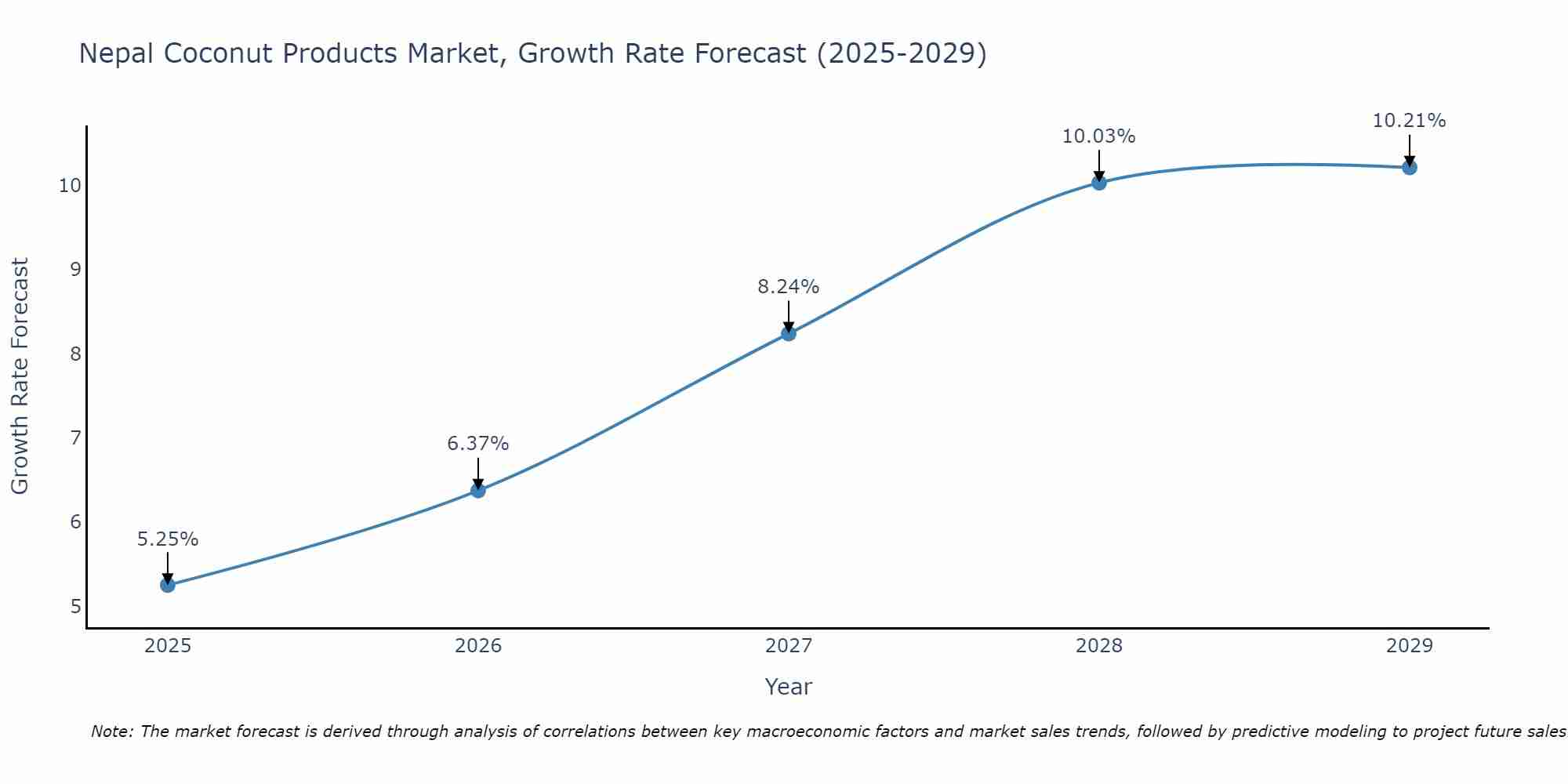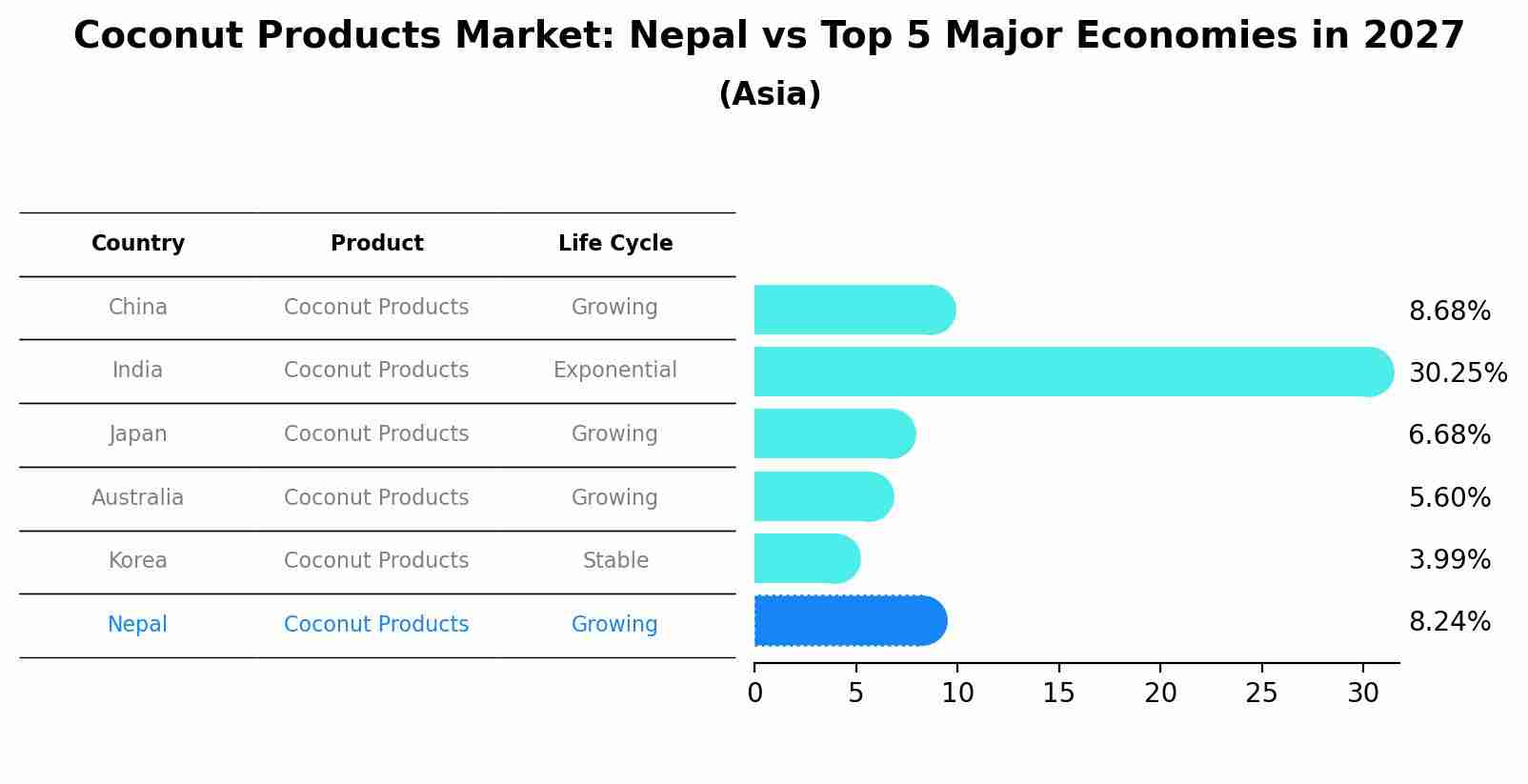Nepal Coconut Products Market (2025-2031) Outlook | Value, Companies, Trends, Size, Growth, Industry, Analysis, Share, Revenue & Forecast
| Product Code: ETC410012 | Publication Date: Oct 2022 | Updated Date: Jul 2025 | Product Type: Market Research Report | |
| Publisher: 6Wresearch | Author: Sachin Kumar Rai | No. of Pages: 75 | No. of Figures: 35 | No. of Tables: 20 |
Nepal Coconut Products Market Size Growth Rate
The Nepal Coconut Products Market is likely to experience consistent growth rate gains over the period 2025 to 2029. Commencing at 5.25% in 2025, growth builds up to 10.21% by 2029.

Coconut Products Market: Nepal vs Top 5 Major Economies in 2027 (Asia)
In the Asia region, the Coconut Products market in Nepal is projected to expand at a growing growth rate of 8.24% by 2027. The largest economy is China, followed by India, Japan, Australia and South Korea.

Nepal Coconut Products Market Synopsis
The Nepal coconut products market is witnessing steady growth driven by increasing consumer awareness about the health benefits of coconut-based products. Coconut oil, coconut water, coconut milk, and coconut flour are among the popular products in the market. The demand for organic and natural products is on the rise, leading to a growing preference for coconut products as they are perceived as healthier alternatives to traditional cooking oils and beverages. The market is characterized by the presence of both local and international brands offering a variety of coconut-based products to cater to the diverse consumer preferences. With the growing popularity of plant-based diets and the increasing focus on health and wellness, the Nepal coconut products market is expected to continue its upward trajectory in the coming years.
Nepal Coconut Products Market Trends
The Nepal Coconut Products Market is experiencing a growing demand for various coconut-based products such as coconut oil, coconut water, and coconut flour due to their perceived health benefits and versatility in cooking. Consumers are increasingly seeking natural and organic products, leading to a rise in the availability of organic coconut products in the market. Additionally, the trend towards plant-based diets and the increasing awareness of the sustainability of coconut farming practices have further fueled the demand for coconut products in Nepal. Manufacturers are also innovating by introducing new product formulations and packaging to cater to the evolving consumer preferences. Overall, the Nepal Coconut Products Market is witnessing a positive growth trajectory driven by health-conscious consumers and the expanding market for natural and sustainable food products.
Nepal Coconut Products Market Challenges
In the Nepal Coconut Products Market, some challenges that are commonly faced include limited domestic production leading to heavy reliance on imports, fluctuating prices due to external factors such as weather conditions and global demand, lack of standardized grading systems affecting quality control, inadequate infrastructure for processing and distribution, and competition from other alternative products. Additionally, issues related to sustainability practices, such as deforestation and exploitation of labor, can also impact the market. Overcoming these challenges would require investments in modernizing production facilities, implementing quality standards, promoting sustainable sourcing practices, and enhancing market awareness and demand for coconut products in Nepal.
Nepal Coconut Products Market Investment Opportunities
In the Nepal Coconut Products Market, there are several attractive investment opportunities. With the increasing awareness of the health benefits of coconut products, there is a growing demand for items such as coconut oil, coconut water, and coconut-based snacks. Investing in coconut plantations for a sustainable supply chain or establishing a processing facility to produce value-added coconut products could be lucrative ventures. Additionally, exploring the export potential of Nepali coconut products to international markets can offer significant growth opportunities. Collaborating with local farmers to improve cultivation practices and quality standards can also be a promising investment strategy in this emerging market segment. Overall, the Nepal Coconut Products Market presents various avenues for investment with the potential for long-term growth and profitability.
Jordan Agar Market Government Policies
The government policies related to the Nepal Coconut Products Market primarily focus on promoting domestic production, ensuring quality standards, and encouraging exports. The government has introduced initiatives to support coconut farmers, such as providing subsidies, training programs, and access to modern agricultural practices. Additionally, regulations are in place to monitor the quality of coconut products to meet international standards, enhancing the market competitiveness. In terms of exports, the government offers incentives and facilitates trade agreements to expand market opportunities for Nepali coconut products globally. Overall, the government`s policies aim to boost the coconut industry`s growth, improve product quality, and increase market access both domestically and internationally.
Nepal Coconut Products Market Future Outlook
The future outlook for the Nepal Coconut Products Market appears promising, driven by increasing consumer awareness of the health benefits of coconut-based products such as coconut oil, coconut water, and coconut-based snacks. The market is expected to witness steady growth due to the rising demand for natural and organic products, as well as the versatility of coconut as an ingredient in various food and beauty products. Additionally, the growing popularity of plant-based diets and the expanding use of coconut in culinary applications are likely to further fuel market growth. However, challenges such as fluctuating raw material prices and competition from other alternative products may impact market dynamics. Overall, with evolving consumer preferences towards healthier and sustainable options, the Nepal Coconut Products Market is poised for expansion in the coming years.
Key Highlights of the Report:
- Nepal Coconut Products Market Outlook
- Market Size of Nepal Coconut Products Market, 2024
- Forecast of Nepal Coconut Products Market, 2031
- Historical Data and Forecast of Nepal Coconut Products Revenues & Volume for the Period 2021 - 2031
- Nepal Coconut Products Market Trend Evolution
- Nepal Coconut Products Market Drivers and Challenges
- Nepal Coconut Products Price Trends
- Nepal Coconut Products Porter's Five Forces
- Nepal Coconut Products Industry Life Cycle
- Historical Data and Forecast of Nepal Coconut Products Market Revenues & Volume By Type for the Period 2021 - 2031
- Historical Data and Forecast of Nepal Coconut Products Market Revenues & Volume By Coconut Water for the Period 2021 - 2031
- Historical Data and Forecast of Nepal Coconut Products Market Revenues & Volume By Coconut Oil for the Period 2021 - 2031
- Historical Data and Forecast of Nepal Coconut Products Market Revenues & Volume By Coconut Milk for the Period 2021 - 2031
- Historical Data and Forecast of Nepal Coconut Products Market Revenues & Volume By Dried Coconut Products for the Period 2021 - 2031
- Historical Data and Forecast of Nepal Coconut Products Market Revenues & Volume By Others for the Period 2021 - 2031
- Historical Data and Forecast of Nepal Coconut Products Market Revenues & Volume By Application for the Period 2021 - 2031
- Historical Data and Forecast of Nepal Coconut Products Market Revenues & Volume By Food for the Period 2021 - 2031
- Historical Data and Forecast of Nepal Coconut Products Market Revenues & Volume By Beverage for the Period 2021 - 2031
- Historical Data and Forecast of Nepal Coconut Products Market Revenues & Volume By Cosmetics for the Period 2021 - 2031
- Historical Data and Forecast of Nepal Coconut Products Market Revenues & Volume By Others for the Period 2021 - 2031
- Historical Data and Forecast of Nepal Coconut Products Market Revenues & Volume By Form for the Period 2021 - 2031
- Historical Data and Forecast of Nepal Coconut Products Market Revenues & Volume By Solid for the Period 2021 - 2031
- Historical Data and Forecast of Nepal Coconut Products Market Revenues & Volume By Liquid for the Period 2021 - 2031
- Nepal Coconut Products Import Export Trade Statistics
- Market Opportunity Assessment By Type
- Market Opportunity Assessment By Application
- Market Opportunity Assessment By Form
- Nepal Coconut Products Top Companies Market Share
- Nepal Coconut Products Competitive Benchmarking By Technical and Operational Parameters
- Nepal Coconut Products Company Profiles
- Nepal Coconut Products Key Strategic Recommendations
Frequently Asked Questions About the Market Study (FAQs):
- Single User License$ 1,995
- Department License$ 2,400
- Site License$ 3,120
- Global License$ 3,795
Search
Related Reports
- Australia IT Asset Disposal Market (2025-2031) | Strategy, Consumer Insights, Analysis, Investment Trends, Opportunities, Growth, Size, Share, Industry, Revenue, Segments, Value, Segmentation, Supply, Forecast, Restraints, Outlook, Competition, Drivers, Trends, Demand, Pricing Analysis, Competitive, Strategic Insights, Companies, Challenges
- UAE Building Thermal Insulation Market Outlook (2025-2031) | Revenue, Companies, Share, Trends, Growth, Size, Forecast, Industry, Analysis & Value
- Portugal Electronic Document Management Market (2025-2031) | Strategy, Consumer Insights, Analysis, Investment Trends, Opportunities, Growth, Size, Share, Industry, Revenue, Segments, Value, Segmentation, Supply, Forecast, Restraints, Outlook, Competition, Drivers, Trends, Demand, Pricing Analysis, Competitive, Strategic Insights, Companies, Challenges
- France Electronic Document Management Market (2025-2031) | Strategy, Consumer Insights, Analysis, Investment Trends, Opportunities, Growth, Size, Share, Industry, Revenue, Segments, Value, Segmentation, Supply, Forecast, Restraints, Outlook, Competition, Drivers, Trends, Demand, Pricing Analysis, Competitive, Strategic Insights, Companies, Challenges
- Portugal Occupational Health & Safety Services Market (2025-2031) | Strategy, Consumer Insights, Analysis, Investment Trends, Opportunities, Growth, Size, Share, Industry, Revenue, Segments, Value, Segmentation, Supply, Forecast, Restraints, Outlook, Competition, Drivers, Trends, Demand, Pricing Analysis, Competitive, Strategic Insights, Companies, Challenges
- Netherlands Occupational Health and Safety Services Market (2025-2031) | Strategy, Consumer Insights, Analysis, Investment Trends, Opportunities, Growth, Size, Share, Industry, Revenue, Segments, Value, Segmentation, Supply, Forecast, Restraints, Outlook, Competition, Drivers, Trends, Demand, Pricing Analysis, Competitive, Strategic Insights, Companies, Challenges
- Belgium and Luxembourg Facility Management Market (2025-2031) | Strategy, Consumer Insights, Analysis, Investment Trends, Opportunities, Growth, Size, Share, Industry, Revenue, Segments, Value, Segmentation, Supply, Forecast, Restraints, Outlook, Competition, Drivers, Trends, Demand, Pricing Analysis, Competitive, Strategic Insights, Companies, Challenges
- Russia Women Intimate Apparel Market (2025-2031) | Strategy, Consumer Insights, Analysis, Investment Trends, Opportunities, Growth, Size, Share, Industry, Revenue, Segments, Value, Segmentation, Supply, Forecast, Restraints, Outlook, Competition, Drivers, Trends, Demand, Pricing Analysis, Competitive, Strategic Insights, Companies, Challenges
- Africa Chocolate Market (2025-2031) | Size, Share, Trends, Growth, Revenue, Analysis, Forecast, industry & Outlook
- Global Hydroxychloroquine And Chloroquine Market (2025-2031) | Industry, Trends, Size, Outlook, Growth, Value, Companies, Revenue, Analysis, Share, Forecast
Industry Events and Analyst Meet
Our Clients
Whitepaper
- Middle East & Africa Commercial Security Market Click here to view more.
- Middle East & Africa Fire Safety Systems & Equipment Market Click here to view more.
- GCC Drone Market Click here to view more.
- Middle East Lighting Fixture Market Click here to view more.
- GCC Physical & Perimeter Security Market Click here to view more.
6WResearch In News
- Doha a strategic location for EV manufacturing hub: IPA Qatar
- Demand for luxury TVs surging in the GCC, says Samsung
- Empowering Growth: The Thriving Journey of Bangladesh’s Cable Industry
- Demand for luxury TVs surging in the GCC, says Samsung
- Video call with a traditional healer? Once unthinkable, it’s now common in South Africa
- Intelligent Buildings To Smooth GCC’s Path To Net Zero













